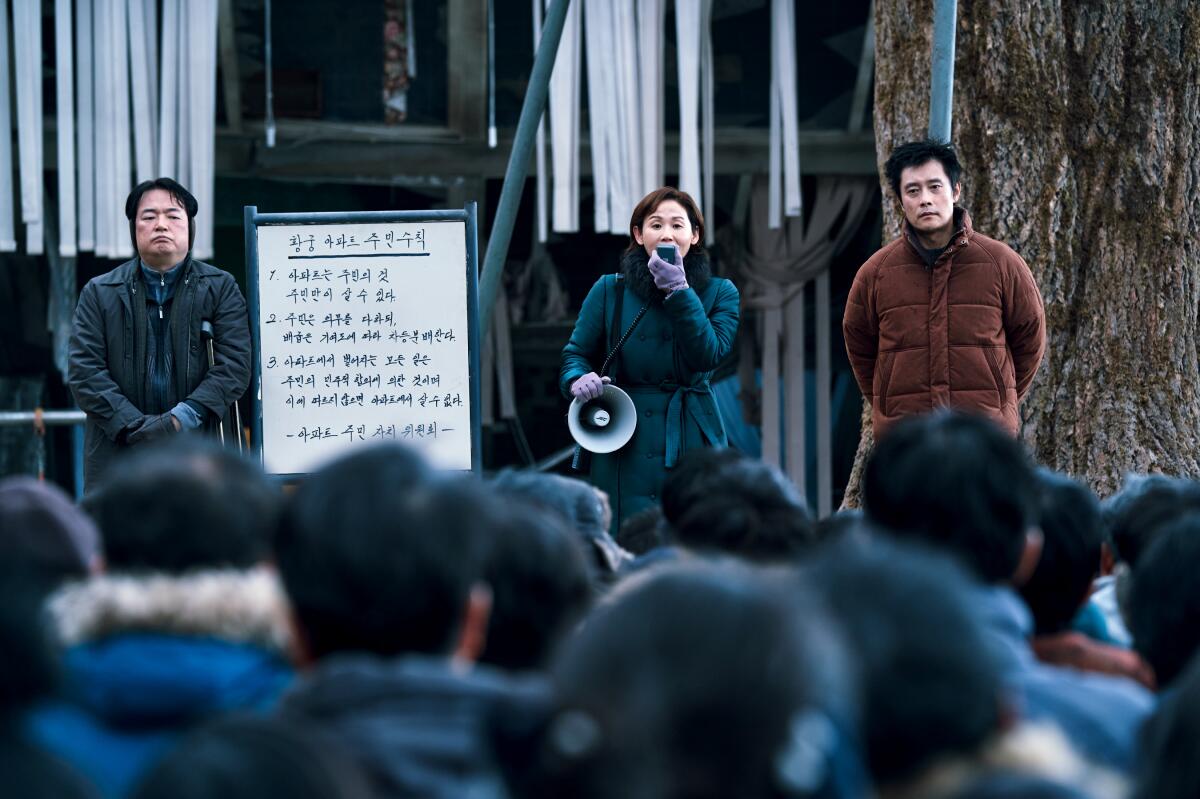
[ad_1]
Rather than an action-packed catastrophe film, “Concrete Utopia,” South Korea’s Oscar entry for worldwide characteristic, performs like a brutal indictment of human nature, each at its most instinctual in pursuit of self-preservation and in its skill for collective care.
You received’t discover the propulsive thrills of “Train to Busan” or the stylization of Ben Wheatley’s “High-Rise” on this philosophically wealthy, blood-drenched marvel from director Um Tae-hwa, however as an alternative a movie nearer in purpose to a gritty post-apocalyptic saga, besides there is no such thing as a contagious virus operating amok, solely individuals giving in to harmful tribalism.
Seoul lies in ruins after a catastrophic earthquake. As far as the attention can see, solely the Hwang Gung house advanced stays standing in a sea of rubble. Food and water shortly turn into scarce for the survivors on this once-generic, now miraculous constructing. Still, the impulse of Min-sung (Park Seo-joon), a younger public servant, and his spouse Myung-hwa (Park Bo-young) is to assist these much less lucky — a minimum of at the start.
Amid the chaos, Young-tak (Lee Byung-hun), a courageous middle-age man who steps in to cease a hearth, emerges because the residents’ unanimously voted chief. His first order enterprise? To violently evict everybody whose residence was destroyed and sought refuge at Hwang Gung. Exiling these outsiders means sentencing them to dying. He is OK with that.
For some time, the house homeowners handle to construct a functioning microcosm with an egalitarian division of duties, however their small society quickly devolves right into a fascist state. Young-tak’s dictator-like ways and his use of dehumanizing language towards these he deems unworthy of the identical privileges — a well timed contact — go unquestioned as a result of he delivers assets and order.

A scene from the film “Concrete Utopia.”
(Lotte Entertainment / 815 Pictures)
Though the humor and appearing in “Concrete Utopia” can sometimes really feel broad, Lee’s viscerally monstrous efficiency grounds a high-stakes drama. Young-tak is keen to capitalize on the calamity to trend himself into the highly effective entity he might by no means be through the earlier than occasions, when he struggled to achieve upward mobility.
Yet it’s Parkas Min-sung, chosen because the chief of the anti-crime drive and more and more compromised, who offers essentially the most ambivalent portrayal. Min-sung obeys Young-tak to make sure entry to assets, however at residence Myung-hwa can’t disguise her disappointment in him. What good is it to outlive if it entails shedding their humanity?
A eager counterpoint to those ethical quandaries, Cho Hyung-rae’s cinematography brims with daring decisions in tandem with the efficient visual-effects work. His photos not solely push aesthetic ingenuity however instill that means, like a second when the residents’ shadows, dancing round a hearth, mission towards their beloved constructing’s facade, as in the event that they had been an historical clan in a cave.
Offering no facile judgment on the “villains,” director Um and co-writer Lee Shin-ji’s adaptation of Kim Soong-Nyung’s webtoon “Cheerful Outcast Part II, Cheerful Neighbor,” presents some characters as naively incorruptible bastions of righteousness who, regardless of their stance, nonetheless profit from the soiled work of those that exit and threat all of it to safe everybody’s primary requirements. Those who imagine themselves to be virtuous are in for a impolite awakening that doing the appropriate factor in disaster isn’t all the time as clear-cut.
The residents’ cardinal sin is putting all of the accountability on a single man, keen to clean their arms of any guilt. As outdoors threats and infighting convey Hwang Gung to the brink of collapse, a hope for one thing higher sparkles precariously.
‘Concrete Utopia’
Not rated
In Korean with English subtitles
Running time: 2 hours, 10 minutes
Playing: In restricted launch
[adinserter block=”4″]
[ad_2]
Source link